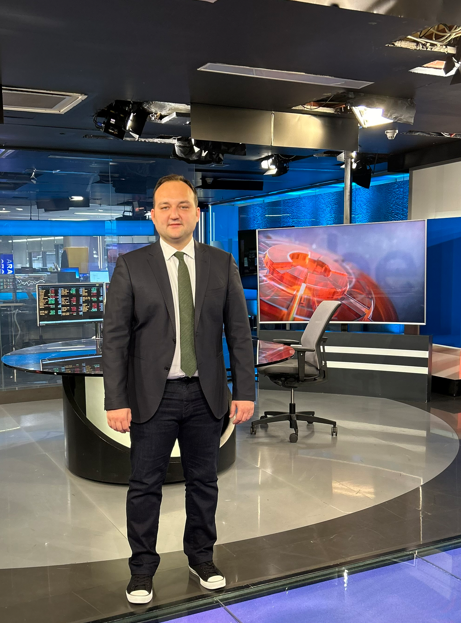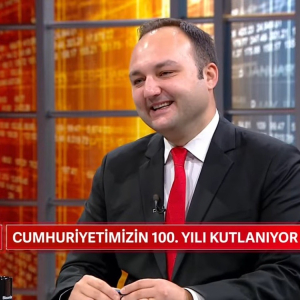Çağlar Kuzlukluoğlu, the Former President of the Atatürkist Thought Club, Talked About Being a Yeditepe Graduate

In the 100th year of our Republic, we knocked on the door of the former President of ATC (Atatürkist Thought Club), Çağlar Kuzlukluoğlu. He warmly welcomed us and answered the following questions sincerely.
Can you tell us about your experience at Yeditepe University?
To be honest, during the years I attended the university, my family and I were going through a challenging period both personally and financially. On the very day of my registration, I had the chance to meet and gather with friends from the Atatürkist Thought Club before classes even began. Those friendships continue to this day. I can say that these initial friendships I formed provided me with the real essence of the 'university' experience. Their unique roles in overcoming difficulties are, in my opinion, invaluable things. Besides the honor of serving as the General Secretary and President of the club, after these roles concluded, in my final year at school, I represented the International Finance Department and the Faculty of Commercial Sciences. I was a part of the University Senate. Each was the result of elections. So, in a sense, I experienced the concept of representative democracy. In fact, during my two years as the ADK President, I was elected once again to serve as the President of the Club Union."
When it comes to classes, I want to mention two esteemed names, unfortunately, we recently lost both of them: Prof. Dr. Fahrettin Ömer Gökay and Prof. Dr. Gazanfer Ünal. Ömer Hoca was the dean of our faculty for many years, and Gazanfer Hoca was, so to speak, the cornerstone of the International Finance Department. It is, in a sense, impossible to receive a bad education from them. Similarly, I have had live broadcasts with Prof. Dr. Necip Çakır and Prof. Dr. Zeynep Yalçın Ökten, both of whom I am currently working with at Bloomberg HT. Prof. Dr. Aslı Alıcı, Prof. Dr. Tülay Alim Baran, Assoc. Prof. Dr. Deniz Tansi, and many other professors have contributed significantly to my education. Perhaps I was not a very successful, high-achieving student, but I believe I received a good education. I have always made an effort to maintain a relationship with my professors, and I still do. In fact, after taking a course with Ahmet Naim Oktay Hoca in my final year, he offered me the opportunity to work in his company while studying.
What differences and advantages did being a Yeditepe student bring to your career?
Being a Yeditepe student is, in my opinion, something beyond common perception. Firstly, being a foundation university with such a large structure is rarely encountered. The years when I was a student, from 2006 to 2011, were filled with significant events for both Turkey and the world. The 2008 crisis, Turkey's political-economic-social agenda... Experiencing such times in ordinary habitats is not easy, I believe. I lived through them fully; I became a part of them. Istanbul and Yeditepe have clearly marked routes for me. Their traces are still visible. The difference and advantage lie in this experience. While certifications, GPA, etc., undoubtedly position you in your resume, your experiences and what they have given you push you beyond mere positioning.
What do you think the turning point of your career was?
Rather than in my career; I initially aimed to study a more socially-oriented field, but I ended up studying International Finance at Yeditepe University. To be frank, I wasn't particularly good with numbers. Perhaps it was an unfortunate incident, but while I was in university, the 2008 Global Financial Crisis erupted. As discussed in academia, economics and finance, among other fields, faced significant challenges. During those times, the Post-Autistic Economics movement was spreading as a critique of the existing understanding of economics. Far from improving my relationship with numbers, I found myself thoroughly enjoying it. Perhaps my first two job experiences didn't align perfectly with what I had in mind, but they significantly enhanced my skills. For almost a decade now, I've been doing a job that I love and received education for. I can materialize my interests and put them into practice. I can delve into areas such as income-wealth distribution, poverty, behavioral economics, political economics, and numerous others. I can conduct interviews with foreign ministers at Davos and academics whose books we have read.
What can you recommend to our students and recent graduates for their career journeys?
The advice section for students and recent graduates is actually a part that I didn't particularly enjoy dealing with even when I was a student. But I can say this: the overwhelming majority of us are being, have been, or will be tested by financial, emotional, or societal challenges yesterday, today, and tomorrow. Aiming to chart our lives on a fair and transparent ground is truly challenging.
Maybe it will sound too casual, but years ago, I came across a profound quote from inside a food package: 'Luck is with the brave.' I still carry that piece of paper. It might be interpreted as a Latin proverb related to the concept of 'beginner's luck,' but in my opinion, it speaks to both the era and us as 'ordinary' individuals. It seems not entirely clear where being merely brave, intelligent, hardworking, or attractive takes us in today's world. However, taking the risk and, most importantly, making an effort towards what we dream and desire, filling it in with substance, brings joy to a person. At least, it brings joy to me. Of course, there can be failure or difficulty within, but when combined with a bit of luck, looking forward to the future becomes more meaningful.
When discussing university, work, and life, I believe it's important to touch upon things that revolve around enjoyment. Living without feeling our humanity is, as we know, tasteless. With the rise of social media, there has been an increased focus on taste both in Turkey and globally. I have been fond of flavors since a very young age; since I graduated, I have spent a lot of time on food and drink. There are times when I put my thoughts into writing as well. However, I don't have the motivation like today's influencers or so-called gourmets. I strive to explore and experience the tastes of Anatolia and different geographical-cultural regions as much as my budget and time allow. I try to travel frequently. As someone who experienced ninth place in Turkey with the high school basketball team, I continue my passion for football and basketball, especially following leagues like the Premier League and Euroleague. "In university, thanks to friends who influenced my music tastes, and in my professional life, those who enriched my film culture, I have a lively appetite for both. Whenever I have the opportunity, I love attending the theater. In the current work environment and daily life, finding time to read something is indeed very challenging. However, I have a penchant for reading. Although I may be slacking in finishing books, I try not to miss out on periodicals in the fields of popular science, popular history, philosophy, and politics. If I could carve out a path for myself, I would like to indulge in photography. I use Instagram, especially for photos that I am interested in.
On the occasion of the 100th anniversary of our Republic, what message would you like to share with our bulletin readers?
Late Professor Ömer asked me to give the graduation speech on behalf of the faculty in 2011. He said, 'Say what you want.' Twelve years before the 100th anniversary of our Republic. I started my words with a quote from Charles Dickens' A Tale of Two Cities: 'It was the best of times, it was the worst of times. It was the age of wisdom, it was the age of foolishness.' In essence, looking back to that day, it wasn't easy to be optimistic about Turkey, the Balkans, the Middle East, and the world. Inspired by the past, especially by Mustafa Kemal Atatürk, I said, 'Our Republic is unlike any other republic in the East or West.' Regardless of what happens, I believe it is still true today and will be so in the second century as well. I concluded my speech again with Dickens: 'Our future will be the season of brightness and the spring of hope.' May the new era of our Republic be the century of reason and conscience. Let us lead the world. Because our debt is to the Turkish Revolution and Enlightenment and to our Eternal Leader.
